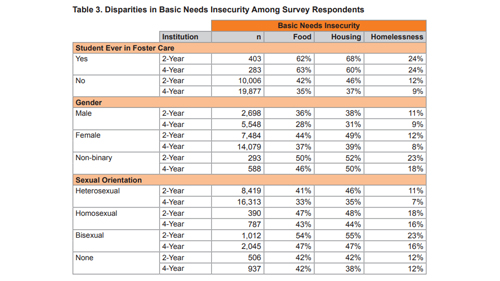
Cookies in use
New Report Highlights Food and Housing Needs for LGBTQ College Students
by Elliott Kozuch •
An alarming new report from Temple University and the Wisconsin HOPE Lab reveals that transgender, non-binary and gender expansive students are more likely to face food and housing insecurity, as well as homelessness, at rates significantly higher than their cisgender peers.
An alarming new report from Temple University and the Wisconsin HOPE Lab reveals that transgender, non-binary and gender expansive students are more likely to face food and housing insecurity, as well as homelessness, at rates significantly higher than their cisgender peers.
The findings of “Hungry to Learn: Addressing Food & Housing Insecurity Among Undergraduates” are based on a survey of 43,000 students at 66 institutions in 20 states and the District of Columbia. It includes more than 20,000 students at 35 four-year colleges and universities, as well as students at community colleges.
LGB respondents faced higher risks of basic need insecurity compared to heterosexual students -- with bisexual students at the highest risk of this group. Nearly half of bisexual respondents experienced food and/or housing insecurity, and -- shockingly -- over one in five bisexual community college students have experienced homelessness.

Table pulled from report
Researchers hypothesize that these disparities are linked to lower levels of family support -- including financial -- experienced by LGBTQ students.
The results are consistent with data recently released by Chapin Hall at the University of Chicago, which found that LGBTQ young adults had a 120 percent higher risk of reporting homelessness compared to youth who identified as heterosexual and cisgender. Estimates show that LGBTQ youth comprise up to 40 percent of the total unaccompanied homeless youth population, even though they make up five to 10 percent of the overall youth population.
Learn more about HRC’s work in the fight for LGBTQ equality on college and university campuses and beyond here.
- Topics:
- Bisexual
- Transgender
Love conquers hate.
Image:
HATE WON'T MAKE US GREAT!
100% of every HRC merchandise purchase fuels the fight for equality.

